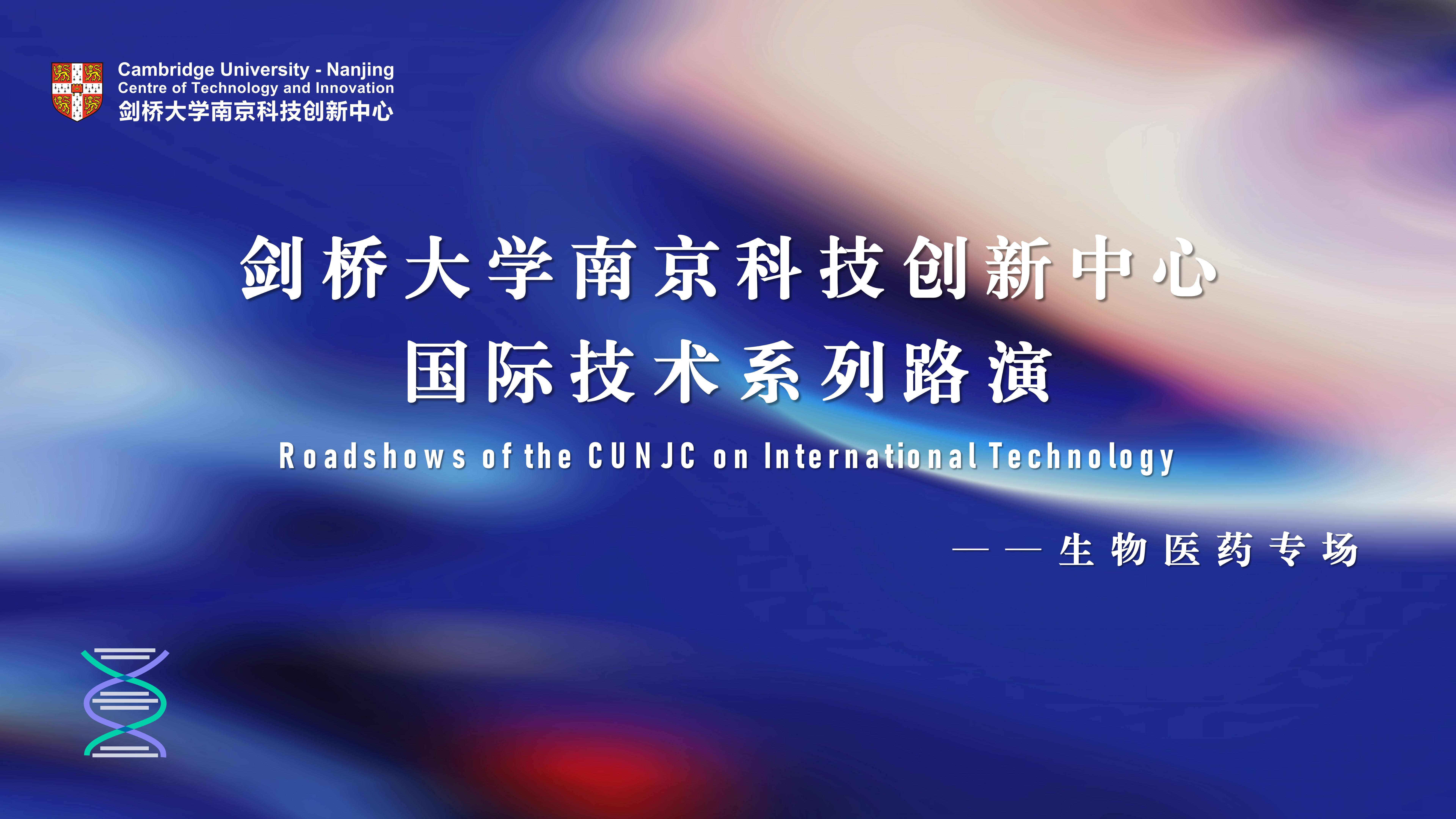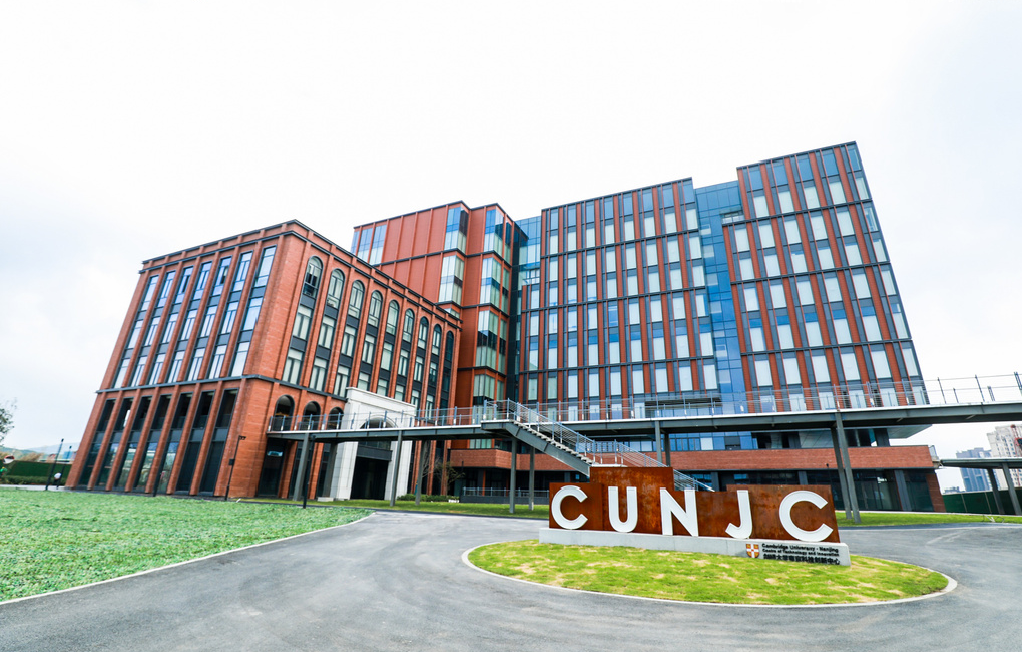The seventh roadshow of the International Technology Roadshow Series
“Directed by application innovation and aiming at industrial needs”, the Seventh Roadshow of CUNJC on International Technology was held successfully. The roadshow was co-organised by Cambridge University - Nanjing Centre of Technology and Innovation (CUNJC) and Nanjing Overseas Collaborative Innovation Centre (Cambridge, UK).

The effect of animal disease prevention and control is closely connected with the viability of animal husbandry, where animal healthcare enterprises are in an upstream position. In “LeilingBio” roadshow, we are committed to applying the world-leading science and technology to animal health and welfare, and developing ground-breaking physical disinfecting, diagnostic reagents, new drugs, vaccines and production processes. This will bring the animal healthcare industry with products of high tech, high quality, and high-level service.
Chen Lei, the founder of LeilingBio, obtained her Master’s degree and Doctorate in Veterinary Medicine from China Institute of Veterinary Drug Control and Chinese Academy of Agricultural Sciences respectively. She also obtained her second PhD degree in Immunology in University of Cambridge UK with highest honor. The continuous cultivation in the fields of veterinary and human medicine has shaped her insight into the animal healthcare industry.
In her view, there are a few critical points in animal healthcare industry: the animal medicine relies on high technology more than human medicine due to animals are unable to speak express themselves; intensively breeding of economic animals is are more susceptible to diseases, resulting in severe economic losses; about 70% of human diseases are directly or indirectly related to animal health. “Especially in the past three years, the diseases represented by African swine fever have shown complex characteristics of longer incubation period, stronger infectivity and more hidden transmission. They have posed serious challenges to the disease prevention in animal protection in China. African swine fever has reshaped the domestic pig industry,” Dr. Chen emphasized.
In response to the above new characteristics of animal diseases, LeilingBio has developed a new technology MAOPA (magnetic beads-mediated all-in-one polymerase chain reaction technology) that is 10 to 100 times more sensitive than the traditional qPCR. In addition, it also developed UNIGEN, a fully enclosed intelligent analysis system that integrates MAOPA and other technologies. The system has various advantages such as higher accuracy and ultra-sensitivity, mixed inspection at super-large sample size, fully enclosed and pollution-free, convenient to one-click operation, integrated AI judgment and automatic reporting, etc..
“UNIGEN is the most sensitive and specific molecular diagnostic product so far,” Dr. Chen said, “Taking ASF detection as an example, the product with high sensitivity can detect the virus 5 to 10 days earlier than the traditional qPCR detection technology, thereby isolating the source of the disease in advance and significantly reducing the loss of a farm. This technology has been verified in the preliminary screening of large aquaculture groups, and brought notable results.”
It is noted that at the aspect of business layout, LeilingBio has reserved several advanced technologies in the four major animal healthcare fields; disinfection, diagnosis, treatment and vaccine. We have begun commercializing our products in physical disinfection and diagnosis fields, and built a second growth curve in pet economy which is on fast track.
The roadshow projects “OxTium” and “BeiZhongYiHe” are gearing up in the mixed fields of biomedicine and artificial intelligence (AI), utilising the computer intelligence technology to empower the life science.
Dr. Jin, the founder and CEO of “OxTium Technology”, graduated from the University of Oxford. His team has made great achievements in biological engineering, natural language processing and cancer research and those members have published more than 50 relevant academic articles in top international conferences or international journals such as Nature. This core team has a solid interdisciplinary development ability of “Biology-Bioinformatics-Artificial Intelligence”.
How to utilise AI to drive early screening and diagnosis of diseases? Dr. Jin opined it is particularly suitable to cut into the relevant scene from the large medical model—doctors need to make judgments based on medical imaging, omics, examination results, electronic medical records and other data types, rather than a single indicator. “Through learning, training and analysis of various data, large medical model at multi-modality can break through the limitation of ‘one method diagnosing one disease’, to achieve the goal of ‘a large model for comprehensive diagnosis of multiple indicators and diseases’, and even form a kind of artificial intelligence similar to a general practitioner.”
Taking omics as a breakthrough, OxTium Technology has developed GeneLLM (Gene Large Language Model), an AI medical diagnosis large language model platform, and launched an omics-based integrated solution for early detection of multiple disease. The solution has the advantages of high sensitivity, high specificity, strong tissue traceability and multi-disease generalisation ability for disease detection. It is currently in early development in multi-cancer and Alzheimer’s disease. The high specificity, sensitivity as well as the single test cost that is much more affordable than that of similar products on the market, enable OxTium product to satisfy the demand of ordinary users for “one blood collection for early screening of a variety of diseases”.
China is encouraging and supporting the development of traditional Chinese medicine (TCM) through multiple policies and measures. Figures indicate that the scale of TCM industry in 2020 was RMB 994 billion, and it is expected to reach RMB 2.97 trillion in 2030, with an annual compound growth rate of about 12%. Meanwhile, traditional Chinese medicine faces the plight of inadequate capability in digital transformation, digitisation and technology application. It is right time for the digital transformation of the Chinese medicine industry.
The roadshow project “BeiZhongYiHe” by Wang Ximing, with MPhil in Economics of Cambridge University, is committed to leading the Chinese medicine innovation with data. The project focuses on the resource endowment of local Chinese medicine universities and enterprises, positioned as a “Chinese medicine academic incubator” to incubate projects in three directions—product, service and scientific research.
How is it possible for AI to empower traditional Chinese medicine? Wang said that the modern therapy of combing Chinese and Western medicine increasingly emphasises the integration of cutting-edge technology and individualised treatment. The AI related technologies—image recognition, knowledge graph and reinforcement learning—have built a bridge between traditional Chinese medicine and computer science. The interdisciplinary teams have made the data, modeling and artificial intelligence of the accumulated TCM experience more practical and meaningful.
As for business layout, in product incubation, “BeiZhongYiHe” enables the proportion screening with clinical data system, to carry out the transformation of consumer products and the research and development of TCM innovative drugs. In service incubation, “BeiZhongYiHe” is constructing a model of TCM rehabilitation chain hospitals and empowered clinics to realise the integration of offline entity and online diagnosis and treatment. In scientific research incubation, “BeiZhongYiHe” has independently developed platforms such as multi-modal information processing system and intelligent prescription system, participated in various projects at ministerial, municipal and university level, and promoted the digitalisation of clinical research and imparting training.
Cerebral diseases, mainly including stroke and cognitive dysfunction, e.g., Alzheimer disease, are the major cause of death and disability in the world with a heavy burden for the society and families. In China, stroke is the No.1 killer and the first cause of disability and Alzheimer disease is the fifth. The population aging leads to an increasing burden of the two diseases. The high morbidity and disability rate, the heavy economic burden, and the lack of effective treatment approach, make the early screening, detection and intervention become nearly the only method.
Focusing on brain examination and function, the roadshow project “Tenoke” assesses the risk of atherosclerotic and aneurysmal diseases by using the combination of in vivo medical imaging and hemodynamic analysis with a growing multicentre database for many years. This project provides intelligent diagnosis assist for an optimal treatment, including surgical planning and quantitative evaluation of treatment effectiveness. In addition, Tenoke’s smart assessment system is able to provide customers with a 10-year risk estimation of cognitive dysfunction through an integration of gene profile, blood markers, magnetic resonance imaging (MRI) of brain tissue, as well as personal life and work habits, sleep and cognitive scales.
Dr. Teng Zhongzhao, co-founder and chief scientist of this project, is currently the group leader of cardiovascular imaging at the Department of Radiology, University of Cambridge, and distinguished professor at Nanjing University and Zhejiang University. Dr. Teng introduced that the rupture of atherosclerotic plaque will lead to blood vessel blockage that is the main cause of stroke. Using the advanced high-resolution, multi-contrast MRI and deep learning, the internal component in the atherosclerosis and aneurysm can be clearly visible.
In the clinical scenario, doctors can optimize the surgery and the follow-up plan to maximize the benefit. In the health check market, especially for those with impaired memory, hearing, smell, or learning ability, Tenoke’s smart brain health screening plan has been deployed in over six hundreds examination centres starting a large-scale commercial implementation. This smart plan can visualize the customer’s brain structure and assess the function to estimate the 10-year risk of cognitive dysfunction and stroke. Based on the collected data of millions of customers, Tenoke’s technologies can generate brain evolution models to provide scientific basis for personalised brain health management.
Prevention and treatment of ageing diseases were the focus of the roadshow. In addition to the early screening solutions for Alzheimer’s by “OxTium” and “Tenoke”, the roadshow also saw CantaBio present its novel therapeutics and diagnostics for ageing-related diseases such as Alzheimer’s and Parkinson’s, and metabolic diseases such as type 2 diabetes.
As an international preclinical biotech company, CantaBio’s core team consists of multiple Cambridge alumni. Dr. Gergely Tóth, the founder and CEO of CantaBio, has been engaged in biotech R&D and drug discovery business for more than 20 years.
.Cantabio is targeting biochemical stress. Dr. Tóth explained that neurodegenerative diseases (such as Alzheimer’s and Parkinson’s) and metabolic diseases (such as type 2 diabetes) are fundamentally related to cell damage caused by excessive biological stress, including oxidative and glyoxal stress, and protein aggregation, etc. Biochemical stress causes breakdown in cell function through toxic processes, which heavily influences the ageing process and can trigger different age-related conditions.
Therefore, “Cantabio’s therapeutic programs are aimed at protecting key proteins from biochemical stress and preserving cells’ own defence mechanisms, preventing the onset of and slowing progression in a number of disease areas,” Dr. Tóth shared.
Specifically, in the case of Parkinson’s, DJ-1’s oxidative states may be an important indicator of Parkinson’s onset and progression. CantaBio’s clinical diagnostic platform enables the detection of distinct oxidative states of DJ-1. The detection is non-invasive, cost-effective and in vitro biofluid-based, which has the potential of becoming an early diagnostic tool for Parkinson’s and other diseases. In Alzheimer’s, the aggregation of Tau has been linked to the onset and progression of the diseases as well as other Tauopathies. CantaBio has also identified novel small molecule pharmacological chaperones that bind to monomeric Tau and thereby prevent misfolding and aggregation of the protein. Tau-targeting candidates have shown efficacy in both in vitro and in vivo models of AD.

In the past three years, the CUNJC has successfully held seven roadshows on International Technology, introducing nearly 30 high-quality applied projects to domestic investment institutions and local industrial parks.
The Centre focused on applied innovation fields such as information technology and renewable energy, biomedicine and healthcare, smart city and environmental conservation, zero carbon and sustainable development, and supported the cutting-edge applied projects represented by Cambridge. The Centre will continue to gather diverse elements from the industry, research community, government and capital, conduct professional promotion to investment institutions, industrial parks and various enterprises, and create an international ecological cycle of sci-tech innovation that integrates technological development and industrial application.

 中文
中文 English
English
